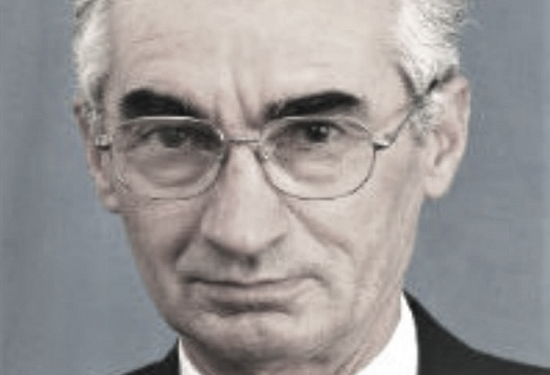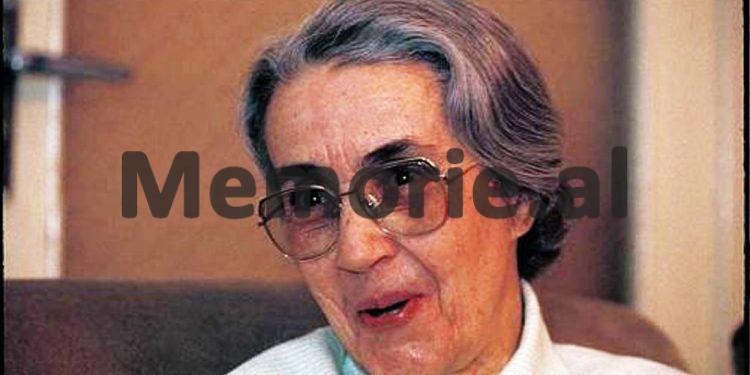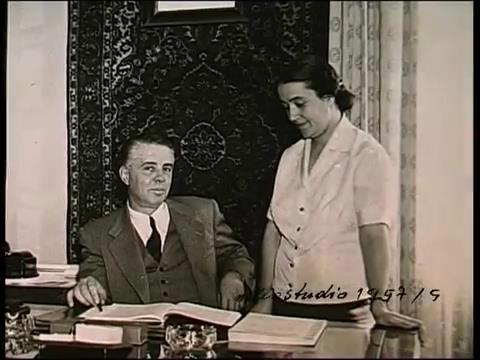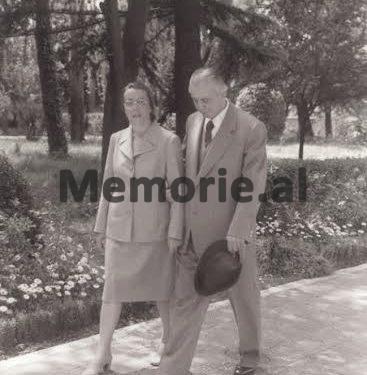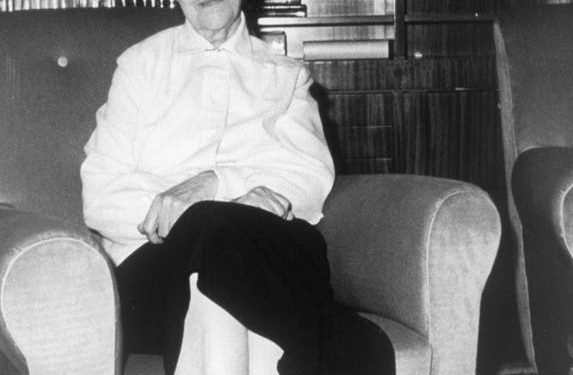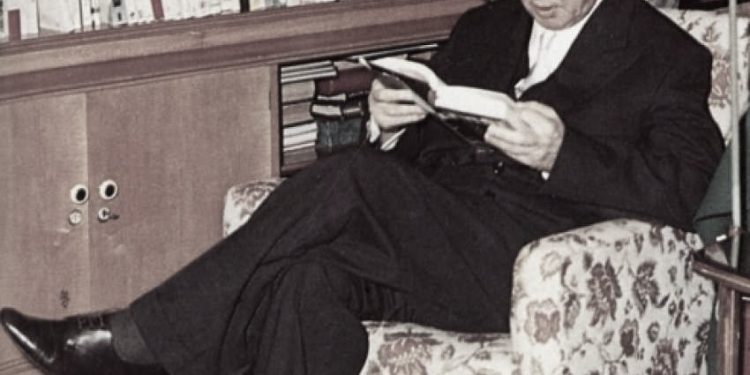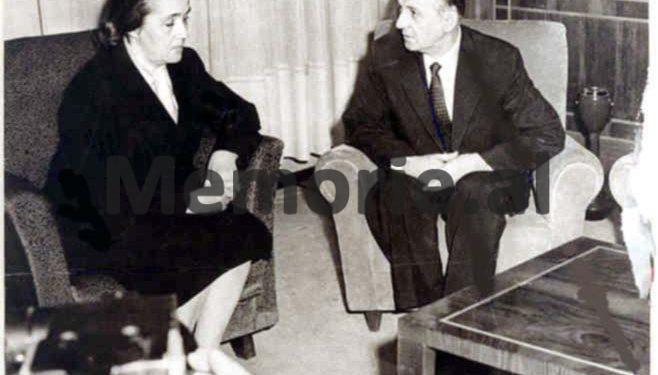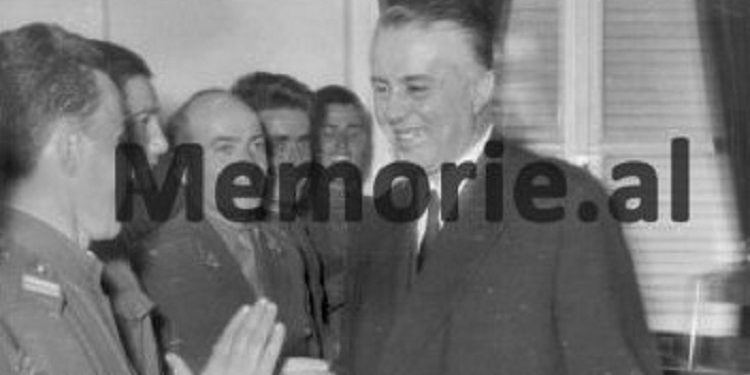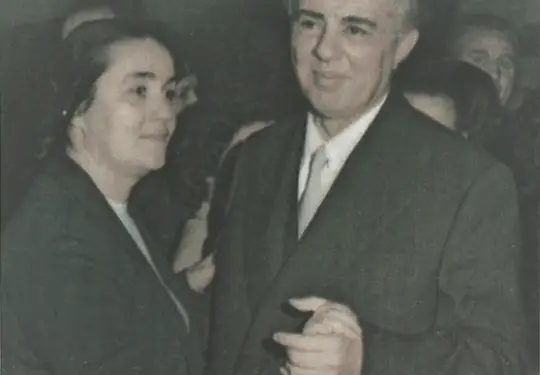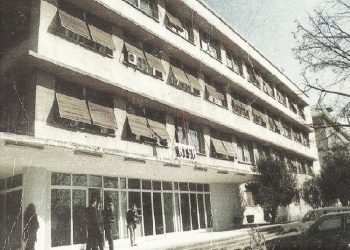By Eugene Merlika
– “DIGNITY” OF SOCIALIST ALBANIA –
Memorie.al / “The identity of the masters of evil”, is the title of a short article of the Italian weekly “Panorama”, dated July 24, 2003. It is a very short comment on the book “The word of the devil” by the Italian journalist Riccardo Oricio , a presentation with a few brushstrokes from him of that thing that is common to all dictators, old and new, their identikit, which in Nuremberg was baptized with the phrase “The banality of evil”.
Alongside bloody dictators such as: Idi Amin or Jean Bedel Bokasa, such as Dyvalje or the Red Negus, Mengistu, coupist generals such as Noriega or Jaruzhelski, two ladies, representatives of Balkan communism, enter the writer’s analysis, such as: “The black widow of Albania, Nexhmije Hoxha” and the “unfaithful Mira Milosevic. It is interesting that the author treats the “monsters” of his book with great understanding. He tries to get into the depth of their “reasons”, which have all remained loyal to their past, its ideas and achievements. “They all have a very bad habit – complains the journalist – they answer questions by asking other questions to get into trouble”.
“What to say to the Stalinist Hoxha, who ironically says: oh, yes, today’s Albania is a beautiful democracy. Dirty, unemployed, violent, greedy, hungry for dollars. At least socialist Albania had dignity”, says the author of the book and the magazine article. In the ears of the journalist Oricio, who knew little or nothing of the Socialist Albania of Mrs. Hoxha, who sees today that of her disciple, Mr. Nano, these words sound somewhat convincing and not insulting? Of course, they cannot have the same sound in the ears of those Albanians who lived to some extent normally, in the second half of the last century, and are even a great insult to those masses of people from the “enemies of the class”, the undeclared slaves of socialism, up to the peasants crippled by poverty and ignorance. Many of the epithets that Mrs. Hoxha wears for her country today best fit the Albania conceived near the partisan fires, by Miladin Popovici and her “legendary” husband.
Dirty, violent, zealous, hungry for dollars was Socialist Albania in every sense of the word. A place where one apartment accommodated two families, where cooking was done in bathrooms, where five hundred people crowded into a military internment barracks, and fifty in a prison cell, where washing powder was not used until recently, where soap was rationed, where sewage systems sometimes didn’t exist and sometimes didn’t work, where trash cans were not known at all, where even the most recent norms of industrial hygiene or environmental protection were not respected, where flies and mosquitoes roamed undisturbed for the most part of public premises, where dust and mud were the daily companions of every step taken by the citizen and even more the peasant, cannot be called a clean place. If some of these phenomena are present even today, no one can prove that they are new things. Post-communist Albania presents, to a non-negligible extent, violence in many forms and levels.
It is right to admit that at the turn of 1990-1991, a fight was avoided, on a large scale, between the student youth and the people of the cities on the one hand, who were looking for freedom and change of the system and the conservative forces of “Enver’s volunteers”, on the other hand, who were determined to preserve the “power of the people” at the price of blood. I think that, regardless of the determining motives, Mrs. Hoxha has her merit in avoiding a bloodbath of the Romanian type. Perhaps the calculations made in those historical moments, decisive for the country, later turned out to be incorrect, perhaps something did not go as it should. That’s why Ms. Hoxha probably regretted her attitude at the time, to the extent that she said in a recent interview: “Yes, personally, as well as my friends, our conscience hurts us a lot, that we didn’t know how to do what we should have done for the protection of the victories of the people’s power and for this regretful opinion we can give an account to the people…”!
Too bad that the only good thing she could have done to her people now, in the twilight of her life, she wants to deny, to reject, to call it a crime, for which she must to give account. It is something natural for her not to call the use of violence a betrayal of “ideals”, with which she was kneaded since her youth. Violence had been the only means by which the communist system was built in Albania and elsewhere. Those who, in various forms, wanted to reduce or avoid them; those who wanted to give a “human face” to the monster communism, Mrs. Nexhmije had sealed them, throughout her life from “First Lady”, with the nickname of the traitor, the revisionist, the opportunist. The violence of its power became proverbial for Europe, turning its country into a “land scourged by persecutions”, as Pope John Paul II defined it.
If the free world had been more coherent to the principles of historical justice and less sympathetic to real politics, it would have declared the Albania of Mr. Hoxha, ‘The classic country of martyrdom in Europe’, according to the figures of crimes of every form, taken in relation to the number of the population, they cannot even be compared to the “Stalinist epic of the gulags”. Mrs. Hoxha, the sight of today’s Albania makes her sad, not because of the poorly realized democracy, but because she would have liked to see it lined up alongside Fidel’s Cuba or Kim Jong IL’s Korea.
Even today there is violence in Albania, bandit violence and State violence. The latter has deep roots, in the mindset inherited from its Institute of Marxist-Leninist Studies, which conceived human society as an arena of eternal and irreconcilable war between classes and within them. “The civilization of an era is the manure of the next,” says the English scholar and critic, Cyril Konoli. Violent Albania, which Mrs. Hoxha denounces, is the logical and real continuation of half a century of violence, whose sons, converted to democracy, were not able to build it away from its contours. If someone, in the era of Ms. Hoxha’s reign without a crown, had dared to say to a foreign journalist the words that she deliberately said to Oricio, I have no idea where the consequences of his punishment would end. I believe that this fact alone is enough for her to understand the difference between the “strong laws” of the “Dictatorship of the Proletariat” of her regime and the tolerance of a democracy that, despite all the mountains of shortcomings, still keeps its face.
The lady shows a short memory when she calls today’s Albania zhelana. Maybe yesterday she equated it with the famous “Leadership Block”! Perhaps, huddled in her ivory tower, she did not know that her subjects, for the most part, boasted that they had grown up on corn bread, that to buy a pint of milk they had to stand in line at one o’clock. at night, that they could only afford a suit with the combined fabric on their wedding day, to keep it until the day of Qivur, that to have a television, a year’s salary was not enough, that even they could dream of having their own car, because it was a dream to live in Tirana or Durrës! They understood how zealous the Albanians were when Mrs. Hoxha and her criminal regime were no longer able to decide their fate. Hundreds of thousands poured into the world, until then unknown and the encounter with it made them better understand the misery they had left behind in their country.
There is still misery in Albania, there is also inequality. It would have been less, if the “Sons of Nexhmija”, who took over the leadership of the country after the collapse of communism, had had clearer ideas and stronger ideals. Albanians still have many problems, some very acute, some new and unknown, but overall, they have less than under the “government” of Mr. Hoxha and his wife. I believe that there are very few who question the veracity of these facts, as “The Black Widow of Albania” does.
Thirsty dog for dollars today’s Albania, an unheard of discovery! Mrs. Hoxha probably still fondly remembers the slogans: “against personal glory”, “against personal interest”, “against private property”, “the fight for bread is a fight for socialism” and other such nonsense, which filled the facades of the walls of the buildings. He remembers the time when all Albanians were included in agricultural cooperatives or state enterprises and worked only for socialism, as if the “power of the people” thought for them, which had forced them to work for a living, just to keep their breath alive. At that time, Albanians were not eager for dollars, but their State was, to the point of forcibly robbing its citizens here inside and tricking the emigrants who sent them to their families, exchanging them for one-sixth of the value, as according to class affiliation.
Instead of ignoring the Albanians who try to earn dollars by all means, Mrs. Hoxha would do well to appreciate their energies and abilities that, in the conditions of freedom, despite the bad management of the State, exploded and are giving their results. If you had not lacked the freedom of initiative for half a century and if there had been government officials up to the task in these years, their country would not be the envy of anyone today. Unfortunately, the lady does not want to see and know this truth. For him, socialist Albania, unlike todays, “had dignity”!
It continues to believe in the myths of dignity: “The invincible fortress of socialism in Europe”, “Standing against the imperialist-revisionist encirclement”, “The titanic struggle of the ALP in defense of Marxism-Leninism”, that of a free people , a fist united around the party and its leader who finds happiness in working to build socialism. It is impossible for her to believe that all those slogans, for the promotion of which a multitude of writers, historians, artists and officials of all levels were paid, were nothing but an avalanche of lies that, starting from the top of the pyramid, spiraled down, haunting the minds of most Albanians. In all these lies, she saw the “dignity” of socialist Albania, despite the fact that it was filled with people imprisoned for their ideas, exiled for their origins, hungry, emaciated, humiliated, turned into herds. , sealed in a hermetic ring…!
That “dignity” was based on terror, on the fact that no one dared to openly say the truth that the war for Marxism was a war for the armchair, that the resistance to the siege was the alibi of the so-called leadership, which ran the State, to cover up the inability of and the failure of the entire economic policy, if it could be called such. In this way, the constant calls for “sacrifice”, which caused the unfinished symphonies of the Albanians’ bowels, took on a meaning. That siege, which was actually a separation from the world, its ideas and changes, had only one specific purpose: to protect the scepter of Hoxha.
The changes of the “post-Stalinist era” were welcomed at first by the “Red Court of Tirana”, it was even possible to reconcile with the “Chief Revisionist” Tito, as per the wishes of the Moscow leadership. But, when the request came from there for the renewal of the leadership, for the replacement of the “King” and his “Chancellor”, the ghost of Marx, as in a “midsummer night’s dream”, began to walk in the “Block” looking for protection of principles. Then blood was drunk with another “defender of principles”, who reigned in the most populous country in the world, and “dignified” Albania became simply “China’s spokesperson in Europe”.
A few years passed in which, with the money of the Chinese and the unpaid labor of the prisoners, who were now added not only from the ranks of the “enemies”, but also from the “war in the heart of the working class”, the factories and combines were built that, for a long time, were trumpeted as the pride of the industrialized Albanian State, which “threw dances in the wolf’s mouth”. When Albania, with the change of the system, was faced with the industrialized world and its demands, it was realized that those “works” had been relics of the antique of technique, which had weighed like a collar on the neck of the economy, absorbing sweat like leeches of Albanians. This was also one of the aspects of dignity, for which, even today, Mrs. Hoxha feels proud.
Meanwhile, Mao Zedong was “fooled” and betrayed the Marxist-Leninist line which, in its original version of a century ago, remained in the hands of Mr. Hoxha as a torch, who carried it forward like a marathon runner. “The shining beacon of socialism in Europe”, resumed the walk in the “winter of great loneliness”, with the slogan, and then grave, “We will eat grass and not kneel”! These years, in which the quixotic delirium of the leaders, was woven with a sledgehammer over their heads, in the memory of Mrs. Hoxha, probably remain as champions of the “dignity of Socialist Albania”.
Those were the years when the alms of the greats of the East stopped coming and those of the West, conditional on reforms and democratization, were not accepted, long years of a slow death of the economy and extreme impoverishment of the inhabitants of Albania, especially those of villages that were two thirds of the country. The principle “with our own strength”, strongly revealed in the stands of Party congresses, had turned into an incentive for everyone to take “their share” from the common wealth. An entire people was kneaded with the idea that the State, no matter how little, should be extorted, an idea that was then fully implemented in 1991-’92, or in 1997, when the raid crossed all borders.
What dignity could such a country have, separated from the rest of humanity, in the name of a complex of megalomania and narcissism of its leaders, worthy of Nero? The dignity of a country lies in its ability to move forward, to measure itself with others in the various fields of human development, in art, science, culture, economy, standard of living, respect for known values and principles and sanctioned in documents and charters of the community of peoples. The dignity of a country is measured by the dignity of its citizens, and the latter cannot exist if there is no freedom of thought, expression and communication of ideas, if the individual is annihilated in the name of the community. Dictatorships, even the most brilliant ones like Alexander, Caesar or Napoleon, regardless of the external appearance, have never radiated dignity. The single possessive thought, even more so of a mediocre one, destroys at first sight any initiative that comes out of the circle of its own judgment, and where there is no brainstorming, no development, no progress, and no dignity.
A people under dictatorship is apt to bring out the weakest sides of its character: hand-kissing, flattery, blind obedience to authority, contentment with little, espionage, submission to all kinds of injustice and arbitrariness, worship of the dictator, blind hatred and contempt for opponents of the regime. All these phenomena were present in the Albania of the Hoxha masters, who, with the help of the regime’s force, violence and fear, managed to break the virtues that the Albanians had inherited for centuries.
A country that turns its citizens into the shackles of depersonalization cannot have dignity. A country that does not know how to appreciate its human wealth, that manages to deny a world personality, like Mother Teresa, that exhumes the remains of a genius like Fishta, that deprives itself of a layer of intellectuals that would have the envy of every country in Europe, it cannot have dignity, I would say, nor a future. That dignity exists only in the fantasy of its leaders, who exchange appearances of servility for true respect. “Nothing is more contemptible than respect based on fear.” says the famous French writer Albert Camy.
Ms. Hoxha would do well to delve into the analysis of the past and her personal responsibility in her events, instead of defending her “with a naked face”. Her struggle is similar to that of Don Quixote with the windmills, perhaps those who still continue to believe in her “catechism” should be searched with candles. To mock, criticize or insult today’s Albania is not a difficult undertaking. But she, who carries on her conscience half a century of her degradation, seems to me that she has no moral right to do it.
I would remind him of a saying of the old Dionysus who, in the antiquity of civilization, preached: “Do so that your word is better than your silence, or remain silent”! Memorie.al
August 2003




